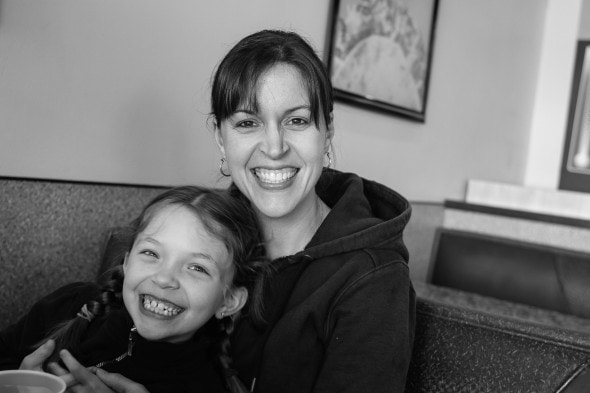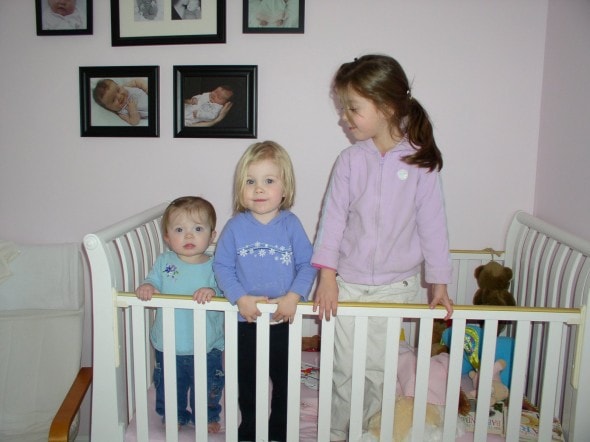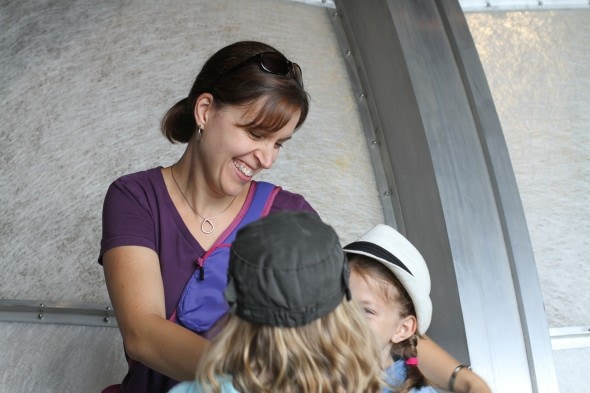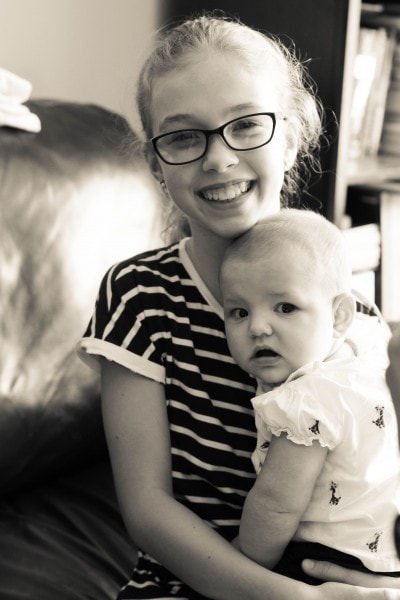This is off-topic, I know! But multiple readers asked about how we’ve taught our kids to work hard and to be kind. Here’s what I wrote about teaching them to work hard. And today’s post will be about teaching kindness.)
In case you missed my earlier post about teaching our kids to be good workers, please hop over and read the caveats at the beginning of that post because they’re applicable here too.
And in addition to those caveats, I’ll add one more: our kids are not kind 100% of the time, and same goes for me. No one gets this perfectly right.
That said, here are some ways we’ve tried to encourage kindness in our kids.

1. Model kindness.
Actions speak louder than words, which means that modeling kindness is key.
Be kind to your spouse, your friends, your co-workers, your family, your neighbors, your garbage-man and grocery cashier…anyone you come into contact with.
Your kids learn how to speak to people and how to treat people by watching you.
Also important: speak to your kids kindly. It’s going to be hard to inspire them to be kind if you’re short with them, rude to them, or approach them in an adversarial way.
2. Teach empathy.
Some kids are naturally good at putting themselves into other people’s shoes, but most kids need some help here.
It’s so much easier to have compassion for and kindness toward someone else if you’ve imagined how YOU’D feel in their shoes.
For example, if one of my kids has said something rude to a sibling and can’t seem to grasp why what they said was rude, I’ll say something like, “Ok, so, what if Dad came home and said this same thing to you. How would you feel?”
And then it usually becomes pretty obvious.
3. Help them anticipate and respond to needs (and model it)
I think this is something that our kids have mostly picked up on by watching.
They’ve seen me drop a gift by for a friend, heard me ask, “What can I do to help you?”, and seen me look for the person in a group who is lonely or by themselves.
I think it’s also helpful to give them ideas for being kind to others…we can share a need with them or share that someone is having a rough time, and help them think of what we could do to help show love or ease someone else’s pain.

4. Point out kind acts that you see.
It’s good to encourage kindness that you see in your own kids, and it’s also helpful to recognize the kindness of others people’s words and deeds. The more examples our kids have, the better!
“Oh, that was so kind of Aunt Danielle to bring me flowers.”
“Aww, it was so kind of them to invite you guys along.”

5. Encourage kindness even to people who don’t “deserve” it.
It’s pretty easy to be kind to people who are kind to us! But the rubber really meets the road when we’re dealing with someone who isn’t kind.
Since we’re Christians, we believe we’re called to be kind even to our enemies…so if that’s true, we’re also supposed to be kind to, you know, siblings. And cousins. And friends. And crabby customers.
We shouldn’t be doormats, but we ARE supposed to respond kindly.
In my experience, a kind response turns away wrath about 75% of the time, so not only is it the right thing to do, it’s also pretty darned effective.
6. Help them learn from unkindness.
I’d rather not ever have my kids be treated unkindly, but we live in a broken world, and unkindness happens.
So, if they come to me with a sad tale of unkind treatment, I try to first offer sympathy, and I also point out that while sometimes we learn how to behave by watching other people, we also sometimes learn how not to behave by watching (or experiencing) other people.
We can use the pain of others’ unkindness to help us avoid unkind behavior ourselves, which kind of ties into the empathy thing.
How do we like to be treated? How do we not like to be treated? And how will we treat others as a result of thinking about that?

Add to my list!
How have you encouraged kindness in your kids? And how did your parents encourage it in you?
P.S. For those of you who share my beliefs, I’d also add that it’s important to pray that God would work in our kids’ hearts and help them to be kind. I pray this for my kids on my own, and also when I pray with them.

Ashley Whitt
Saturday 19th of August 2017
Could you expand on your 'don't be a doormat' advice? I feel like that is the extension of kindess I really struggle with as a parent.
My daughter, who is incredibly kind, will occasionally come home from public school with tales of feeling excluded, or someone who 'wasn't being fair'. (Please do note she generally has a lot of friends and gets along with her peers, I don't feel that she is being bullied). While I do offer sympathy in these situations I struggle with what else to teach her. So far I haven't really explained the harsh reality that life often isn't fair and that for some people kindness isn't a priority. But she is turning 9 soon and is still so incredibly innocent compared to her peers. I am not sure how to guide her into a more realistic, but still kind, worldview.
Kim from Philadelphia
Thursday 17th of August 2017
I agree 100%
My 11 year old has experienced the terminal illness and passing of several family members with whom he was close, has spent time with my husband's special needs uncle, and has a close relationship with my 94 year uncle. These "special" relationships have added to the depth and breadth of his compassion and kindness as they pose additional challenges for a young child. In turn, he is the kid who is comfortable moving outside his comfort zone when kindness is appreciated.
Now, if I could just get him to eat his vegetables!!!!!
Lacy
Thursday 17th of August 2017
This is a great list!
There are so many siblings that tease, bully, taunt, etc each other. A lot of parents seem to think this is just normal behavior for kids and pretty much ignore it. I think it is so important to stop this and teach siblings to be kind to one another. Teach them that their siblings can be their friends for life! That connection can be important to them for the rest of their lives!
In contrast I know some very kind people that came from very unkind homes. Sometimes people learn how to behave by deciding not to be like their parents. It is interesting how some people turn out well from bad environments and others turn out just like the bad parents.
Suzan
Thursday 17th of August 2017
When I think back there are many things I wish I could change. We were broke, my husband non supportive and I was extremely depressed. I made many mistakes and yelled far too much.
However I am relieved that my three are young adults now and I they have learned some things well. For instance when someone annoys them etc I would send them to the shower to wash the bad away and we would have talk about being the bigger person and not to give into retaliation, fighting etc. My autistic boy now talks about his problems in this way. He was taught at school to stop, think and do. He never picked up that think meant to take stock and withdraw. I would hear, "But mummy I did as the teacher said. I stopped and thought that if I hit x then he would leave me alone. So I hit him." Oh dear.
Liz B.
Saturday 19th of August 2017
Suzan, please try and give yourself some grace....parenting is challenging (rewarding, yes, but challenging) under the best of circumstances, and becomes even more so with the additional stressors you mention. I only have one child, and I try my best to do my best for him every day. Some days, there's not much I feel I have to give - maybe I had a sleepless night, maybe I'm sad over a personal loss, some days I'm just more depressed in spite of medication and therapy - but I do the best I can. I'm sure you do, too. Your son's story made me smile. He *did* do as he was taught, right? Lol!
Carla
Thursday 17th of August 2017
I love this list. I would also add a couple: 1. Get some rest. We tend to be crabby and mean when we're tired. Often if one of my 3 kids is out of sorts and being a pain in the behind, I will kindly ask them how they're feeling and often it's something like "I'M FINE!!!" which means they are not. So we take some time together or them alone if I can't be with them. I say, go take a break, read a book, do some colouring, or let's go cuddle. It helps tremendously. And it applies to adults too! If I find myself being mean, I try to go and rest if I can or ask my husband to just sit with me and talk. 2. Apologise to your kids if you've been mean to them. To me, this is HUGE part of modelling good behaviour. Sometimes if point 1 doesn't work and I've already been mean, then once I calm I try to make a point to apologise for being mean in my delivery even if my message was still important. I think it's important to show that when we've been unkind, we can try to smooth that by apologise heartfully. Not easy by any means, but it's very important. 3. ok, I said two but there is a 3rd that just came to my mind, which is to try to look in the bright side, I think a positive attitude in life in general helps us to be kind, it just rolls together.